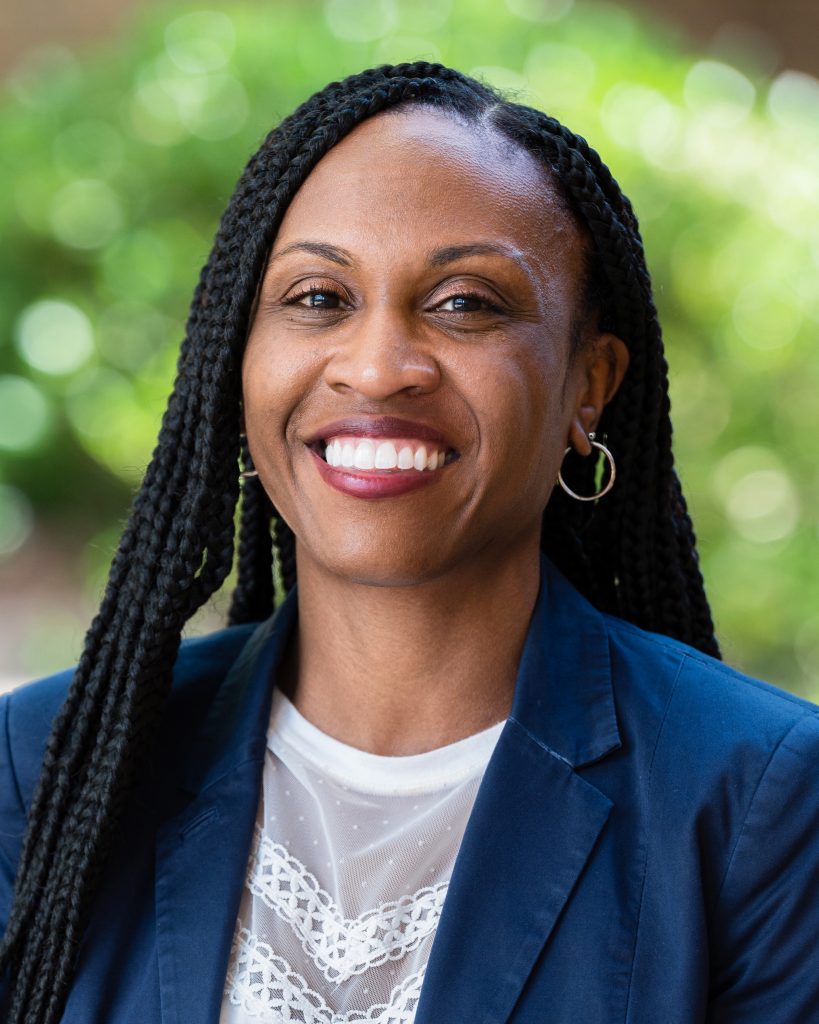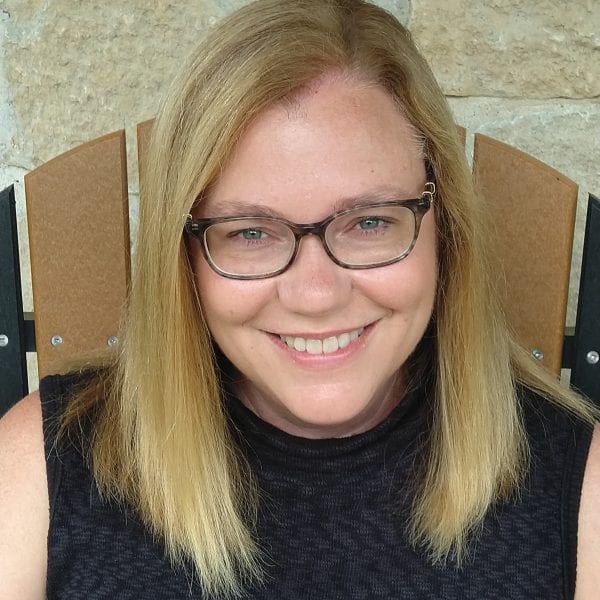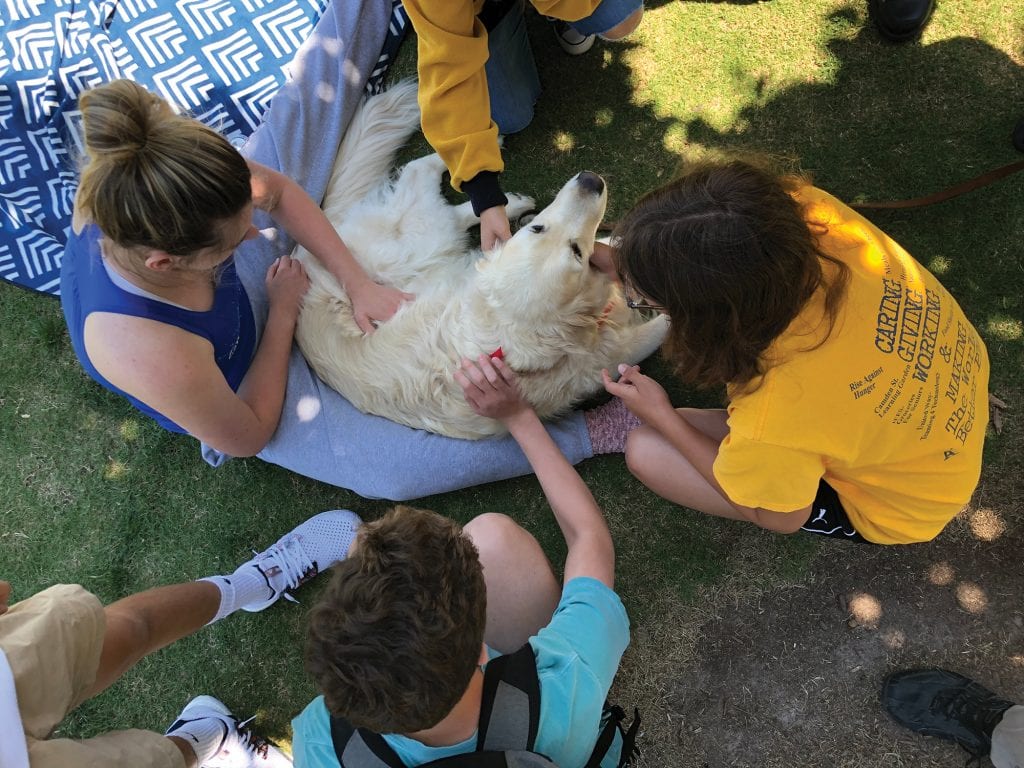In a high performing school like Cary Academy, there can be tremendous pressure on our students. Pressure to get good grades. To look good. To fit in. Add to these the uncertainty and strife that seem to dominate today’s disturbing headlines and you have a significant challenge to emotional health.
Indeed, recent research suggests that, as a country, we are facing a staggering mental health epidemic, with 70 percent of teenagers, aged 13 to 17, reporting that anxiety and depression are major issues amongst their peers.
As we prepare to embark on a new academic year, Middle and Upper School counselors Kelly Wiebe and Twanna Monds sat down to reflect together on their roles, social and emotional health at CA, the challenges of the last trimester, and the road ahead.
WIEBE: I’m often asked to explain what we do as counselors and our role within the CA community. I’m curious, Twanna, how do you respond?
MONDS: As counselors, I like to think that we are advocates. It’s our job to ensure that parents, staff and faculty, and students alike feel comfortable, supported, and heard—regardless of the pressures, questions, stresses, or challenges they may be facing.
I’ve always looked at counselors as the heart of the school, extending openness, kindness, empathy, and warmth to all. I hope that our students, parents, and staff feel that—that they feel supported with their concerns and needs.
WIEBE: Agreed! And you raise an important point: I see us as a facilitators, resources, and a support system not just for our students—although I love working with them individually—but for parents and teachers as well.
MONDS: Addressing social and emotional health is so multidimensional—it is larger than just our students. It takes a true community effort, all of us working together to create a culture of wellness. I like to encourage everyone to look at social and emotional health as they do physical health, something you have to nurture and develop to reap the short- and long-term benefits throughout your life.
WIEBE: That’s why I enjoy seeking out opportunities to partner with parents and teachers as part of the process of supporting students. It might mean facilitating a large-scale effort, like screening the documentary Screenagers for teachers during a faculty meeting, while offering another screening for parents in the evening. Or, on a smaller—but equally important scale—it might mean having individual meetings with a parent or teacher regarding a specific issue or concern.
MONDS: Those macro and micro-level efforts are both so important, don’t you think? They allow us to cultivate student wellness from both ends of the spectrum, from the community-level to the personal.
WIEBE: Yes! When students come to the Middle School, they are embarking on a process of self-exploration. They are actively trying on different identities to see how they fit—figuring out ways to be an individual, to separate from others (and from their parents, especially!). At the same time, they want to belong, to fit in with their peers. The tension and conflict that this creates can be challenging for students and families to navigate.
And, of course, if all that wasn’t enough, add on 24-hour access to seemingly unlimited information—all that is “out there” in the world for them to sift through and process—and then layer on the academic pressures, the busy sports schedules, the deepening ways of relating to people—it’s not surprising that the teen years can be so confusing and trying!
MONDS: Absolutely. While further along in their development, we see similar challenges in the Upper School, including the information overload. Students are changing friend groups. They’re discovering new interests, exploring their independence and what it means. They’re learning more about who they are as people—and who they want to be. That’s a lot!
Add to that the pressures of the college search, the prospect of moving outside the home and being truly independent, and exposure to social scenarios that can be increasingly difficult to navigate and manage—it can become overwhelming quickly.
That’s why so much of the programming in the Upper School is designed around preparing students for that independence, around cultivating personal responsibility, and equipping them socially and emotionally to deal in healthy ways with whatever comes next.
Social and emotional health is both a core part of the curriculum but also integrated throughout the student experience, through advisory activities, Student Council initiatives, and clubs.
WIEBE: Yes, social and emotional development has also been a primary focus in the Middle School for a long time—long before the buzzwords of Social Emotional Learning even became popular. For the past decade, our Charger Trails program has been a cornerstone initiative, guiding students toward self-awareness, relationship skill development, team building and bonding, and cyber education.
Over the years, our teachers have provided opportunities to explore a broad range of topics from friendship making, to compassion for self and others, even self-care like ergonomics. Layered over this, our advisory program provides the backbone of support for student and families—offering everyone a place to be known.
MONDS: I think there is also a school-wide commitment to helping students de-stress. Whether bringing in therapy dogs during exam week—the students loved that—or the PTAA providing grade-level snacks and treats, we try to offer those moments for everyone to take a break, to take a breath, and just relax for a few moments.
WIEBE: I know we were both happy to see that CA’s new strategic plan includes an explicit call for the cultivation of an environment of student wellbeing.
I think the decision to shift to later class start times is a great example of that commitment. There is a lot of research out there on the importance of adequate sleep for teens, and we certainly heard firsthand how much students were enjoying getting more sleep during our virtual T3.
In the Middle School, we are also looking at adding advisors to certain grade levels. Advisors play such critical role in support—now even more than ever—and a lower advisor/advisee ratio not only allows for individualizing support but plays into the development of close and supportive group dynamics.
MONDS: I’ve been pleased to see how responsive and agile CA can be in matters of community wellness—how we are always looking to innovate and improve upon our programs and approach.
I witnessed that during the early days of last semester’s virtual period. Our initial attempt at a virtual schedule proved challenging and overwhelming for both students and staff. After concerns were voiced, a survey was developed to solicit opinions and feedback. The staff and students were heard, and the schedule was adjusted to better support the overall wellbeing of everyone involved.
Of course, that was just one challenge of many presented by the pandemic. What was your experience like in the Middle School? What were your big takeaways?
WIEBE: Yes, a pandemic certainly isn’t particularly conducive to stress reduction! First, I think it’s important to not make any assumptions. There were as many reactions to virtual learning as there were students—and those reactions changed daily!
Regardless of how well-executed, I think virtual school generally runs counter to what feels normal to teens. At a time that they are supposed to be “testing their wings”, instead they were forced to stay home. I had students share about their feelings of isolation and boredom, about their concerns and worries about things outside of their control.
MONDS: For me, the past semester was all about making sure that students knew that I was available to them, about making them feel safe and supported. I tried to meet the students where they were emotionally, with the understanding that their feelings could change in an instance. And when they did, it was important to allow them to feel that way, to acknowledge it, and support them.
“
WIEBE: Yes, and the need to be readily accessible, meant being available and reaching out to our community in new ways. It ultimately led to more direct student skill development through means such as the Tip of the Week—an emotional wellness tip or exercise that I would email out every week. My goal was to help students develop a toolbox of social/emotional health strategies that they could tap into during times of stress.
I think part of the challenge was also supporting teachers. This was a new, stressful, and sudden change for them as well. To a large extent, T3 was about helping each other through a process of grief and grieving that was unique to each individual.
MONDS: That a great point. While we were all experiencing this together, our reactions are intensely personal and there is no right or wrong to them; they are all valid. I think it is important to remind people to own and honor their own feelings, rather than comparing them and their coping experience to someone else’s.
As we transition into summer and then the new academic year, my advice is to have open communication, empathize, and express your feelings. It’s ok if you feel like you don’t know what to do. We are all trying to figure this out together.
WIEBE: That’s good advice. I also think it’s important to not have a “doom and gloom” mentality. Yes, there are a number of challenges ahead, but our students and our community are so very resilient. I have faith in our ability to face these challenges with strength.
Change equals stress, but it also equals the opportunity for growth. In a way, it feels safer to think outside the box, to try something new because we are forced to. The nature of the pandemic means that we are all in this together. I think you will see this bare out in greater collaboration.
MONDS: You and I have already experienced this, through our recent joint work with our peers at Ravenscroft and Durham Academy. In fact, we are in the process of developing resources to share with families to help in preparation for the transition back into school.
WIEBE: Yes, as we look to next year, we are focusing on ways to provide targeted support for students to help during this unique time. And we’re working with students to develop individual self-care plans and learning structure plans.
Ultimately, we are prepared to pivot as needed because the year has untold adventures on the horizon!
Across all our efforts, I like to think we can help by providing larger context and guidance, particularly since we often see firsthand some of the challenges our students may be facing—whether it is academic pressures, challenges within friend groups, explorations of identity, or anything in between.
A school-wide commitment to supporting students during times of stress has led to fun (and furry) support programs, such as visits from therapy dogs during exams.
Meet the Counselors

Twanna Monds
This summer marks the beginning of my second year at Cary Academy. I have been a public-school educator for 16 years. I am licensed as a School Counselor and Clinical Mental Health Therapist. I am a National Board-Certified Teacher, Career Development Facilitator, and currently completing a PhD.
What is your favorite CA experience?
My favorite moment from this past school year was being lost on campus with other new CA students. They asked me for help at the same time I was asking them for help. We shook our heads at each other when we realized we were all lost newbies.
What do you love most about your work? What is
most rewarding?
I love having conversations with students. I enjoy hearing what they think, how they feel, what is (and isn’t) important to them—just everything. Kids have such a genuine, empathetic, open heart. It is the most rewarding when I am given the opportunity to be a part of their journey and they allow me into their hearts.
What are you looking forward to for the 2020–21 academic year?
I am looking forward to the unknown—which I realize is probably an odd thing to say. Having uncertainty is not necessarily a bad thing. It allows for creativity. I am excited to see what this unknown will create for all of us at CA, during the next school year.

Kelly Wiebe
I am entering my seventh year at Cary Academy. As a licensed therapist (both in mental health counseling as well as marriage and family therapy), I have been working with teens in the development of their social and emotional health for over 20 years. I have been fortunate to be a part of adolescent journeys in both public and private school settings as well as in private practice.
What is your favorite CA experience?
The first day of school is my favorite. It is amazing how much Middle School students grow in one summer! Plus, I get to meet the newest Chargers for the first time.
What do you love most about your work? What is
most rewarding?
I love the Middle School years. It is a time of great growth and change—albeit not all of it easy! Nothing in more rewarding than being able to be a small part of an individual’s steps from childhood to adulthood.
What are you looking forward to for the 2020–21 academic year?
Change is difficult but it also provides the opportunity for growth. Knowing this year will be a time of change, I am excited to see the growth that will unfold.
Counseling Programs
Time spent in Middle and Upper School are wonderful and exciting—and not without challenges (perhaps even more so given current conditions). Here are just some of the programs that Twanna Monds and Kelly Wiebe have implemented over the 2019-20 school year to support CA students on- and off-campus.
Middle School
- Parents met with social media expert and Social Institute founder Laura Tierney for her talk #WinAtSocial, for tips on guiding children through appropriate, healthy, and safe social media use.
- Middle School parents and faculty viewed Screenagers: Next Chapter, a documentary that tackles topics of stress, anxiety and depression with a focus on improving adolescent well-being in a digital age.
- Charger Trails is a signature program that takes a holistic view of developing social and emotional skills during the key Middle School years. Each grade level focuses on designing activities around relationship development, self-awareness, cyber education, and team building/bonding.
- The Positivity Project asked students to participate in a character strength survey with resources on 23 character traits that teachers used as supplemental material.
- T3’s Tip of the Week offered students virtual learning-specific coping strategies, including mindfulness, stress reduction, the benefits of laughter, and combatting Zoom fatigue.
- The iCanHelp Club fostered positivity throughout the school year with Take One/Give One encouragement note board, hot chocolate and candy giveaways, the 6th Grade’s Compliment Jar (which went virtual in T3), and a Meme Challenge.
Upper School
- The inaugural Parent Book Club, supported by the PTAA and CA’s Wellness Committee, discussed parenting strategies after reading How to Raise an Adult: Break Free of the Overparenting Trap and Prepare Your Kid for Success by Julie Lythcott-Haims.
- The 10th grade Emotional Health Class curated and crafted Inspirational Quotes during T1 and T2. These, in turn, became uplifting emails sent to all 10th grade students during T3.
- Each 10th grader completed a questionnaire about their connections, support people, and summer activities as part of the Summer Mapping Project, in order to ensure that they have the support and resources to navigate the summer break.
- During AP testing for 11th and 12th graders, Ms. Monds emailed students relaxation techniques from their 10th grade classmates created around the 5 senses for 5 nights.
- Communication and connection are some of the pillars of social emotional support. As we spent T3 practicing social distancing, Ms. Monds checked-in individually with all of CA’s 9th graders, all 12th graders, and all of CA’s African American students, to support and provide care during this unprecedented time.

